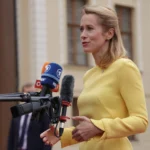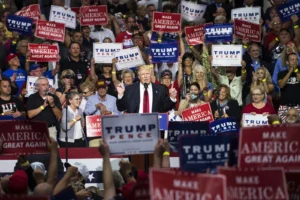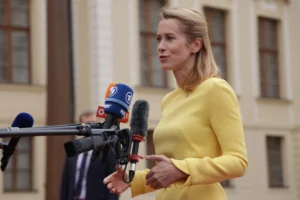In March 2012 a French Algerian called Mohammed Merah murdered three soldiers and shot dead three Jewish children and a rabbi in southern France; three years later two French Algerian brothers murdered the staff of Charlie Hebdo and later in the year men of Algerian heritage were among the terror cell that slaughtered 130 people in Paris. The two teenage killers of the elderly Normandy priest in July 2016 could also trace their lineage to that region of North Africa, and it is an Algerian woman awaiting trial who is accused of the horrific rape and murder of 12-year-old Lola last October in Paris.
These crimes elicited scant comment from Algeria. As a government spokesman said in refusing to allow Merah to be buried in the land of his fathers: ‘Algeria has nothing to do with this case.’
The Algerian government took a similar line after the Kouachi brothers targeted the office of Charlie Hebdo in January 2015. Ramtane Lamamra, then Algeria’s minister for foreign affairs, declared that the killers ‘have no links with Algeria’. Furthermore, he said: ‘It is important not to identify French citizens by their origin. Even when this is done in good faith, it is often the first step towards conflating the issue.’
Evidently, the Algerian government has changed its position. After the fatal shooting last month of Nahel, the French-born teenager of Algerian origin, killed by police as he fled a vehicle checkpoint, Algiers issued a statement saying that they were ‘concerned about the peace and security that our nationals should enjoy in their host country’. Algeria reminded France that it had a ‘duty of protection’ towards all Algerians living in France. Members of Algeria’s diplomatic community participated in a march for Nahel on June 29, an event that was broadcast on Algerian television.
The Algerian media – not known for the sympathy it displays towards France after terrorist attacks – has also had much to say about the death of Nahel. The daily newspaper El Watan said it was symptomatic of the racism of the French state and the brutality of its police force.
It has been alleged that the Algerian intelligence service has been active on social media platforms, in effect acting as state-sponsored trolls, inundating sites such as Twitter and TikTok with videos and images championing the rioters as ‘freedom fighters [and] descendants of the Algerian Mujahedin’.
The response from Paris to the Algerian provocation has been silence, a fact lamented by Pierre Brochand, the former head of France’s DGSE (the equivalent of MI6). In an interview with Le Figaro, he stated: ‘The total absence of any public reaction to the astonishing Algerian diplomatic declaration… shows the extent to which our weakness inside is coupled with our weakness outside.’
Brochand, who also served as his country’s ambassador to Hungary, Portugal and Israel, claimed that the Algerian government is ‘laughing’ at the chaos unleashed by their nationals in France.
Relations between Paris and Algiers have deteriorated since Abdelmadjid Tebboune was elected president in 2019, a victory his critics described as ‘illegitimate’. He had adopted an aggressive stance towards France, demanding an apology for its 132 years of colonial rule. Emmanuel Macron has refused to comply although he has expressed his willingness to work towards ‘reconciliation’.
In June this year Tebboune ordered the reinstatement in the national anthem of a controversial verse in which France is told: ‘O France, the time of reproof is over/And we have ended it as a book is ended/O France, this is the day of reckoning/So prepare to receive from us our answer!’
The anthem was written in 1962, shortly after Algeria gained independence from France, but the verse has not been sung for decades out of respect for the former colonial power.
A few days later Tebboune visited Russia where he described his host, Vladimir Putin, as ‘a friend of humanity’. For the Algerian president it was the chance to strengthen the ‘deep strategic partnership’ with Russia and to have a further dig at France. During the fight for independence, Algeria received backing from the Soviet Union and Tebboune proclaimed: ‘Our ties never changed. Algeria has always supported Russia.’
There are many among the 2.6 million Algerian diaspora in France who are fully integrated into their adopted country and make invaluable contributions; two of the three soldiers murdered by Mohammed Merah were of Algerian origin and many others have excelled in all walks of life in France.
But for some time the right in France has demanded restrictions on the number of Algerians permitted to enter the Republic, and last month Macron’s former PM, Edouard Philippe, added his voice to the calls. The crux of the issue is a 1968 treaty between the two countries whereby Algerians wishing to relocate to France can do so relatively easily.
Under Macron the flow of Algerians into France has increased and last year the number of student visas rose from 30,000 to 38,000. In welcoming the influx, Macron said ‘We would like to have a much more flexible approach to selective immigration… artists, sportsmen and women, entrepreneurs and politicians who nurture bilateral relations.’
That’s an admirable sentiment but it’s not the issue; France’s problem is what to do about its citizens of Algerian descent who hold the Republic in violent contempt.
This hatred has been on display for decades. In 2001 France and Algeria contested their first football match since independence, a match in which the players were hailed as ‘messengers of peace’. But the goodwill was lost on the Algerian fans. First, they booed the Marseillaise and then, with France leading four to one, they invaded the pitch forcing the abandonment of the match. ‘I was not expecting that at all,’ said French defender Lilian Thuram. ‘The Algerian hymn was not booed, there was respect for Algeria. Why did these young people, most of whom were born in France, boo their country’s anthem?’
It was a question that the French political class couldn’t answer. They still can’t 22 years later, but the hatred is now more visceral than ever, stoked by troublemakers in Algiers.
Source : The Spectator

















Add Comment